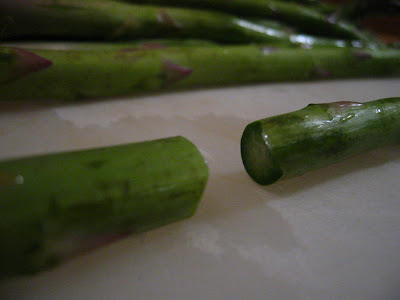But the real benefit of this vegetable is that it adds extra class to even the simplest of meals. You can really raise the pedigree and the aesthetic appeal of even the most basic entree by placing a few steamed asparagus stalks alongside it on your plate. Expensive restaurants use this trick all the time--why can't we use it at home too?
 So in keeping with Casual Kitchen's continuing efforts to promote healthy, affordable and delicious eating, today's post will contain simple instructions on how to prepare steamed asparagus.
So in keeping with Casual Kitchen's continuing efforts to promote healthy, affordable and delicious eating, today's post will contain simple instructions on how to prepare steamed asparagus.1) As with all vegetables, it's a good idea to rinse the stalks well in cold water before cooking.
2) After rinsing, the only real prep work you need to do with asparagus stalks is to cut off the tough, woody ends. There are two schools of thought, however, on how best to do this. One technique is to firmly grasp the stalk at each end...
 ...bend the stalk until it breaks...
...bend the stalk until it breaks... ...and then discard the stalk below the break. The problem with this method is that you end up discarding up to 40% of the asparagus, much of which is perfectly edible.
...and then discard the stalk below the break. The problem with this method is that you end up discarding up to 40% of the asparagus, much of which is perfectly edible.A second technique, for those of us who simply hate wasting food, is to cut off just the bottom two or so inches of each stalk with a knife and discard that portion only.
 The trade-off here, however, is that at times the ends of some stalks may seem a bit undercooked compared to the more tender asparagus tips. This shouldn't be an issue if you like your vegetables a bit firm and crunchy anyway.
The trade-off here, however, is that at times the ends of some stalks may seem a bit undercooked compared to the more tender asparagus tips. This shouldn't be an issue if you like your vegetables a bit firm and crunchy anyway.3) Now it's time to cook the asparagus, and this is the easiest part of all: Pour an inch or so of cold water in the bottom of a saucepan, bring it to a boil, and then add the stalks so that they're laying on their sides (they don't need to submerged under the water). Cover and simmer for 4 minutes (3 minutes for thinner asparagus stalks), and then test the asparagus for doneness. They should be a delicious looking dark green, and they should be tender, but not mushy.
4) Drain the water away and serve immediately.
Didn't I tell you this was easy? Of course, there are many other ways to cook asparagus besides this simple steaming method, but this is a really easy way to get started for any cooks out there who have never had the pleasure of preparing this delicious vegetable at home. If you're curious about other ways to prepare asparagus, I've prepared a list of easy asparagus recipe links below for further reading. Enjoy!
Two final notes:
1) On storing asparagus:
Asparagus is a sturdy green that will keep for several days in your refrigerator. Here's a way to store it for maximum shelf life: Put a couple of tablespoons of cold water into a plastic bag, add the asparagus stalks and close the bag tightly. Then prop up the bag in your fridge so that the asparagus stalks can stand upright. The stalks will absorb the water in the bottom of the bag and keep crisp and fresh for longer.
2) On seasoning asparagus:
Like many vegetables, asparagus is mild in taste. Unfortunately, mild-tasting veggies often tempt cooks to cheat by overseasoning with butter or salt. I'll set aside (for another post perhaps) the questionable ethics of seasoning food for other people without their input, and simply recommend that you leave out the butter and salt entirely and instead try your asparagus seasoning-free. This is a veggie that should be experienced in all of its subtle glory. Barring that, consider sodium-free and fat-free seasonings such as a splash of lemon juice, a dash of cayenne pepper, or some fresh ground black pepper.
Asparagus Recipes:
Roasted Asparagus from Simply Recipes
Balsamic Roasted Asparagus from MyRecipes
Stir-Fried Asparagus with Garlic and Ginger from About.com
Pickled Asparagus Recipe from About.com
Penne with Asparagus and Cherry Tomatoes from the Food Network
Pan-Fried Asparagus from Allrecipes (although eesh on the butter)
Related Posts:
Antioxidant Alert! How to Cook Swiss Chard
Using Salt = Cheating
Quite Possibly the Easiest Lentil Soup Recipe You’ll Find Anywhere
Green Bean Salad: Another Ridiculously Easy Side Dish
How can I support Casual Kitchen?
If you enjoy reading Casual Kitchen, tell a friend and spread the word! You can also support me by linking to me, subscribing to my RSS feed, or submitting this article, or any other article you particularly enjoyed here, to bookmarking sites like del.icio.us, digg or stumbleupon.



















